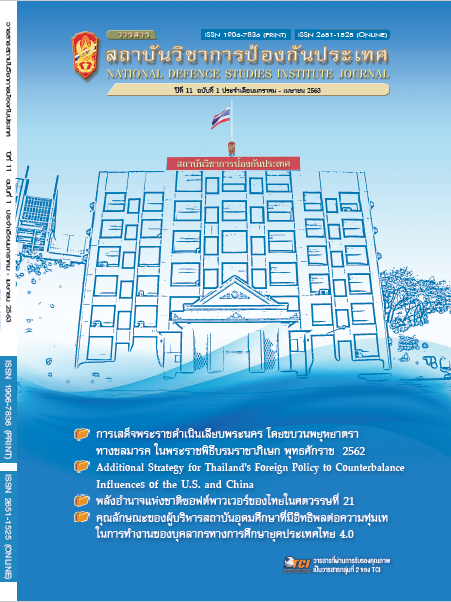The Development of Master of Art Interdisciplinary Curriculum for Security of Chulachomklao Royal Military Academy
Main Article Content
Abstract
Interdisciplinary programs are accepted and appreciated by scholars and those interested in being a tool to produce people with knowledge and skills that are suitable for the changing era. Therefore, when Chulachomklao Royal Military Academy entered the process of creating a curriculum of this type at the master's degree level, the research process was used to develop the curriculum systematically. The main objective of this research was to develop a Master of Arts Interdisciplinary Program in the area of Security Development to have quality in accordance with the qualify standard of Thai Qualification Framework of the Higher Education (TQF: HEd). The research method was a mixed method. The tools were a questionnaire to survey the further education needs of prospective students and a data collection form from the focus group of the curriculum and the national security experts. The statistics used for data analysis were frequency, percentage, mean, standard deviation. The content analysis was implemented for qualitative data.
The results of the research showed that Curriculum development based on academic principles that implement the curriculum development theory. The drafted curriculum was revised to be more complete according to the proposal of the experts to reflect adherence to the TQF precisely, and all topics must also be related and consistent with each other to aim to produce graduates who would be able to integrate the knowledge of development for security. The survey of educational needs covered the essential characteristics of the curriculum, found that most require a program on weekends, and do not require a thesis. The reason for further study was to increase the educational background and new knowledge. Many factors influence further education, but an interesting factor is the courses must focus on the content that will be useful for future work.
Article Details
The articles, images, tables, graphs, written content, and opinions published in this journal are solely those of the authors and do not necessarily reflect the views or positions of the National Defence Studies Institute or its academic affiliates.
References
กรธัช อยู่สุข. (2556). ปัจจัยที่ควรพิจารณาในการตัดสินใจเรียนหลักสูตรทางด้าน MBA: “11 Cs to Consider in MBA Course”. สืบค้นจาก http://www.gotoknow.org/blogs/post/422667.
กระทรวงศึกษาธิการ สำนักงานคณะกรรมการการอุดมศึกษา (2560). เกณฑ์มาตรฐานหลักสูตรระดับอุดมศึกษา พ.ศ.2558 และเกณฑ์มาตรฐานที่เกี่ยวข้อง. สำนักมาตรฐานและประเมินผลอุดมศึกษา สำนักงานคณะกรรมการการอุดมศึกษากระทรวงศึกษาธิการ. กรุงเทพฯ: วงศ์สว่างพับลิชชิ่ง แอนด์ พริ้นติ้ง.
เจษฎา มีบุญลือ, พ.อ. (2553). ความมั่นคงแห่งชาติ: การสร้างชาติไทยให้ยั่งยืน. กรุงเทพฯ: ศูนย์ศึกษายุทธศาสตร์
สถาบันวิชาการป้องกันประเทศ.
ทัศนีย์ ชาติไทย. (2555). แรงจูงใจและความต้องการในการศึกษาต่อระดับบัณฑิตศึกษา มหาวิทยาลัยธุรกิจบัณฑิตย์.
(รายงานผลการวิจัย). กรุงเทพฯ: มหาวิทยาลัยธุรกิจบัณฑิตย์.
ทัศนีย์ บุญเติม. (2551). การสร้างหลักสูตร. มหาวิทยาลัยขอนแก่น.
ธนาชัยวัฒน์ เดชาสินธ์เจริญ. (2553). ความต้องการศึกษาต่อในระดับปริญญาโท มหาวิทยาลัยเอกชนในเขตกรุงเทพมหานคร. (วิทยานิพนธ์ปริญญามหาบัณฑิต). มหาวิทยาลัยหอการค้าไทย.
ธาวุฒิ ปลื้มสำราญ. (2553). ความต้องการศึกษาต่อหลักสูตรการศึกษาดุษฎีบัณฑิต คณะพลศึกษา มหาวิทยาลัย
ศรีนครินทรวิโรฒ. (รายงานผลการวิจัย). มหาวิทยาลัยศรีนครินทรวิโรฒ.
นเรศน์ วงศ์สุวรรณ, พันเอก. (2556). การทบทวนแนวคิด การปฏิรูป และการบริหารจัดการภาคส่วนความมั่นคงในประเทศไทย. สืบค้นจาก https://www.sscthailand.org/uploads_ssc/rethinkingthesecuritysectorsreformandgovernanceinthailand.pdf
ประดิษฐ์พงศ์ โตธรรมเจริญ. (2555). ปัจจัยที่มีผลต่อการเลือกเรียนปริญญาโทคณะบริหารธุรกิจระหว่างมหาวิทยาลัย
รัฐบาลกับมหาวิทยาลัยเอกชน (วิทยานิพนธ์ปริญญามหาบัณฑิต). มหาวิทยาลัยเทคโนโลยีราชมงคลธัญบุรี.
ปัญญา อนัตธนาชัย และคณะ. (2560). การพัฒนาหลักสูตรศิลปศาสตรมหาบัณฑิต สาขาศิลปะการจัดการ สถาบันรัชต์ภาคย์. วารสารรัชต์ภาคย์, (ฉบับพิเศษ ครบรอบ 23 ปี).
พนารัช ปรีดากรณ์. (2558). ความมั่นคงแห่งชาติ. สืบค้นจาก http://www.aseanthai.net/ewt_w3c/ewt_news.php?filename=index&nid=3166
พร พิเศก. (2558). กองทัพบกกับภัยคุกคามรูปแบบต่าง ๆ. กรุงเทพฯ: ศูนย์พัฒนาหลักนิยมและยุทธศาสตร์ กรมยุทธศึกษาทหารบก.
พรรณพนัช จันหา และอัจฉริยา ปราบอริพ่าย. (2558). ปัจจัยที่มีผลต่อความต้องการศึกษาต่อระดับปริญญาโทที่
มหาวิทยาลัยเกษตรศาสตร์. วารสารสาขามนุษยศาสตร์ สังคมศาสตร์ และศิลปะ, 8(1), 291-318.
“พระราชบัญญัติกำหนดวิทยฐานะผู้สำเร็จวิชาการทหาร (ฉบับที่ ๖) พ.ศ.2558” (2558). ราชกิจจานุเบกษา.
”พระราชบัญญัติสภาความมั่นคงแห่งชาติ พ.ศ.2559” (2559). ราชกิจจานุเบกษา.
วริศรา ดวงตาน้อย และคณะ. (2556). ความต้องการศึกษาต่อระดับบัณฑิตศึกษาสาขาการบัญชี (วิทยานิพนธ์).
มหาวิทยาลัยราชภัฏอุตรดิตถ์.
วันวิสาข์ แก้วสมบูรณ์. (2556). เหตุจูงใจในการศึกษาระดับบัณฑิตศึกษา. สืบค้นจาก http://www2.tsu.ac.th/grad/
report/files/06044949200949.do
วิชัย วงษ์ใหญ่. (2554). การพัฒนาหลักสูตรแบบครบวงจร เอกสารประกอบการสอน รายวิชาทฤษฎีการพัฒนา และ
เปลี่ยนแปลงหลักสูตร. กรุงเทพฯ: บัณฑิตวิทยาลัย มหาวิทยาลัยศรีนครินทรวิโรฒ.
สำนักงานคณะกรรมการการวิจัยแห่งชาติ. (2541). แนวทางปฏิบัติจรรยาบรรณนักวิจัย. กรุงเทพฯ: สำนักงานคณะกรรมการการวิจัยแห่งชาติ.
สุมิตร สุวรรณ และ จันทิมา จำนงค์นารถ. (2554). ความต้องการศึกษาต่อในระดับบัณฑิตศึกษาของครูและบุคลากร
ทางการศึกษาในพื้นที่ภาคตะวันตก (รายงานผลการวิจัย). มหาวิทยาลัยเกษตรศาสตร์.
Maslow, A.H. (1970). Motivation and Personaltity (2nd ed.). New York: Harper & Row.
Taba, H. (1962). Curriculum Development: Theory and Practice. New York: Harcourt Brace Jovanovich.
Tyler, R.W. (1949). Basic Principles of Curriculum and Instruction. Chicago: The University of Chicago press.
Yamane, T. (1973). Statistics: an introductory analysis. New York: Harper & Row. 886.


